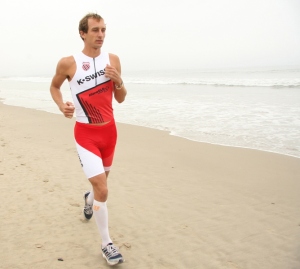By Meredith Sharpe
A Detroit-based legally blind athlete filed a lawsuit against three triathlon associations last Wednesday, claiming discrimination against the disabled. The suit, filed at the U.S. District Court for the Eastern District of Michigan, alleges that the associations’ enforcement of a policy which requires all visually impaired athletes competing in triathlon events to wear “blackout glasses” is in violation of the Americans with Disabilities Act of 1990 (ADA).
Plaintiff Aaron Scheidies has resisted the use of blackout glasses in competition since the policy’s introduction in 2010, but the three companies responsible for its enforcement, USA Triathlon (USAT), the International Triathlon Union (ITU), and 3-D Racing, LLC, have so far ignored his complaints. The rule forces legally blind athletes with partial vision like Scheidies, who has ten percent of the vision of a fully sighted person according to a 2009 profile by the ITU, to wear glasses which render them completely sightless. Because partially blind and completely blind athletes compete in the same category, the Defendants believe that removing the former’s advantage creates a “fairer competition.” Though the rule applies only to the run portion of the race, the Plaintiff insists that blackout glasses could result in dangerous consequences for blind and sighted athletes alike. “I am very aware of the medical effects of making yourself blind and then attempting to run as fast as you can,” argues Scheidies, who holds a doctorate degree in physical therapy from the University of Washington. “The result is loss of balance, vertigo, disorientation and significant risk of falling. This rule puts not only the person wearing the glasses at risk but all other competitors on the course. It is extremely dangerous.”
Richard Bernstein, Scheidies’s legally blind lawyer and a frequent participant in ADA-related cases, claims that the rule violates the Act, which stipulates that a qualified individual with a disability is entitled to reasonable accommodation. He argues that the rule is the opposite of accommodation; instead, it takes away the little sight that partially blind athletes have, putting them in an unfamiliar and dangerous condition.
More legally significant, though, are the rule’s discriminatory implications. Bernstein holds that the rule strips blind athletes of their dignity in depriving them of their full ability to compete. When Scheidies tested the glasses with a guide, he hit his head on a pole, fell into a ditch, and ran off the road several times, experiences which he describes as “the most humiliating and scary times of [his] life.” But Scheidies, a seven-time Triathlon World Champion and eight-time National Champion, claims he is taking a stand against discrimination not only for himself, but for the blind community. “I am not doing this for myself. I am doing this as an ambassador for the blind and visually impaired community. Over the last 2 years we have tried everything to work with USAT and ITU but they have not listened. I fear people will get hurt and others will be detoured from participation,” he explains. He hopes that the voice of a prominent athlete, as well as the lawsuit’s consequences, will reverse these effects.
Despite their previous lack of response, the ITU maintains that they are implementing a new paratriathlon classification system and committed to finishing the project by 2013. The new system will require a full revision of the ITU competition rules and categories and is intended to include an elimination of the blackout glasses rule, a goal the company originally hoped to accomplish by 2012.
The plaintiff does not seek monetary retribution at this time. Instead, the suit calls for an injunction against the enforcement of the blackout glasses rule and full and equal access to all offered programs and services for individuals with disabilities. Despite the ITU’s claim that they are already in the process of eliminating the rule, Scheidies is skeptical and refuses to wear the glasses in competition, even as the case is brought to trial. “The thought of having to wear those glasses makes me want to hang up jersey and shoes and call it a career.”

